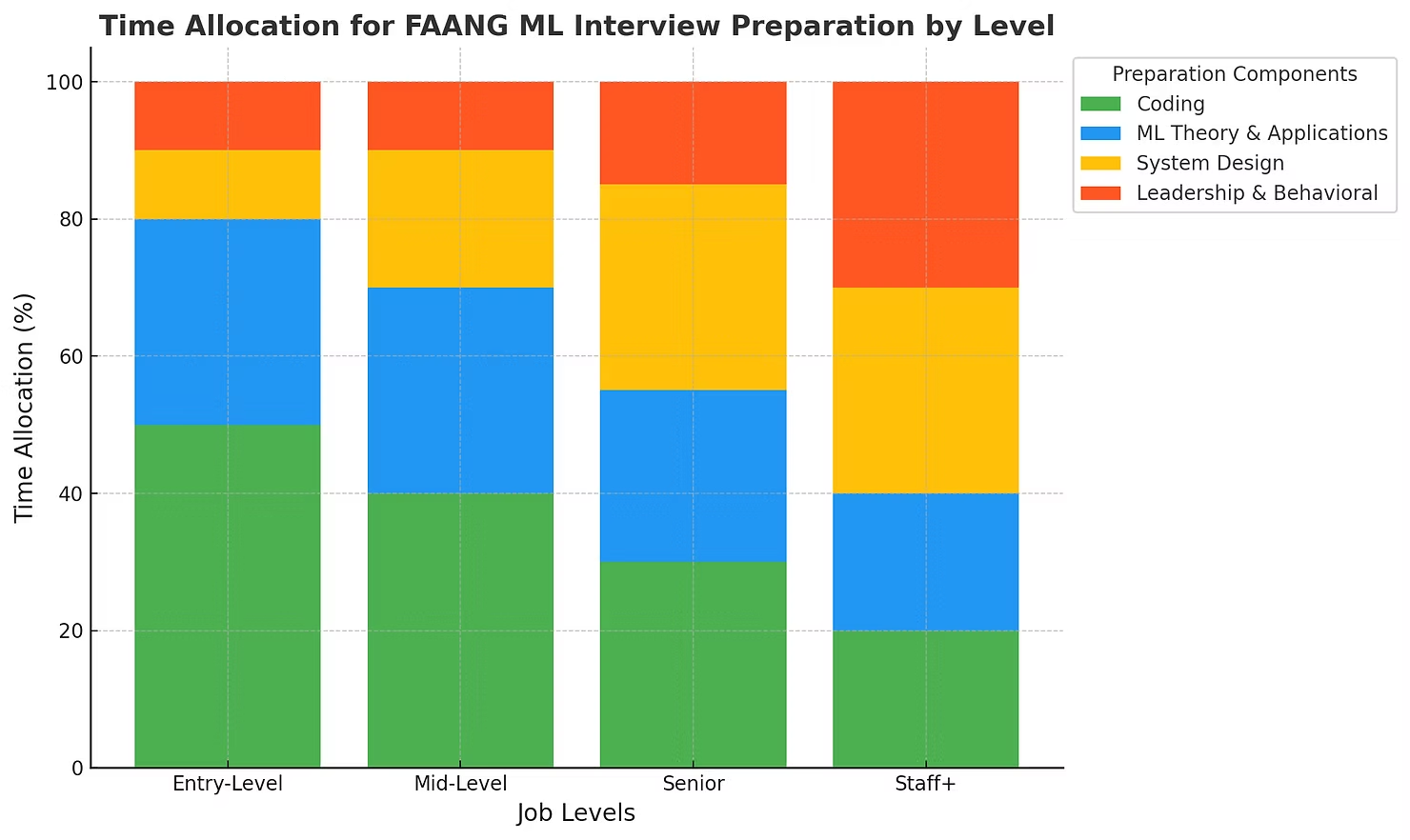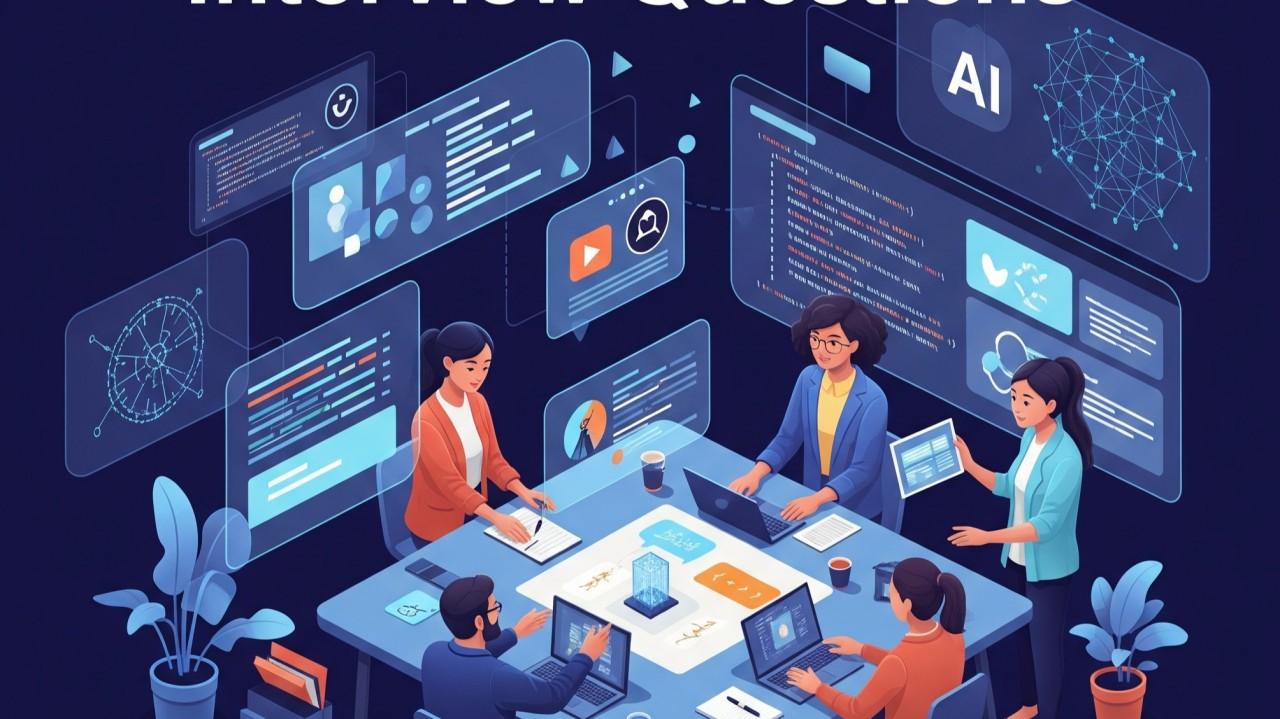1. Introduction
Cracking a Machine Learning (ML) interview at a FAANG company—Facebook (Meta), Amazon, Apple, Netflix, and Google—is both a prestigious
and challenging endeavor. Each role demands excellence in coding, system design, ML expertise, and
leadership. But with strategic preparation tailored to your target level, success is achievable.
This guide outlines how to allocate your preparation time effectively across these components and offers insights into what to focus on
for various job levels. Let’s decode the FAANG ML interview process, step by step.
2. Understanding FAANG Levels
Preparing for a Machine Learning (ML) interview at FAANG companies requires a nuanced understanding of the expectations tied to
various job levels. Here's an in-depth look at the roles and their unique demands.
Entry-Level Roles (E3, L3, or Equivalent)
Key Characteristics:
These roles are primarily for fresh graduates or engineers with 1-2 years of experience.
Focus is on technical execution under guidance.
Expectations:
Coding Proficiency: Strong foundation in algorithms and data structures. The ability to solve
problems efficiently is essential.
ML Basics: Understanding of supervised learning, unsupervised learning, and basic
statistical methods. Knowledge of a few ML libraries (like Scikit-learn or TensorFlow) is
beneficial.
Behavioral Skills: Demonstrating eagerness to learn and adapt to new technologies.
What Sets Successful Candidates Apart:
The ability to write clean, efficient code.
A grasp of practical ML applications, even through personal or academic projects.
Mid-Level Roles (E4, L4, or Equivalent)
Key Characteristics:
Engineers at this level are expected to take ownership of well-scoped tasks and begin contributing independently.
Often targeted by engineers with 3-5 years of experience or those transitioning to ML roles.
Expectations:
Coding: Solid grasp of mid-level to advanced algorithmic problems.
Expect to encounter more dynamic programming and graph-related questions.
ML Knowledge: Proficiency in training, validating, and deploying models. Candidates should
also understand basic model optimization and feature engineering.
System Design: Familiarity with small-scale design, such as APIs for ML services or model
deployment pipelines.
Behavioral Skills: Clear communication and collaboration with cross-functional teams.
What Sets Successful Candidates Apart:
The ability to independently manage an ML project, from ideation to deployment.
Effective communication of trade-offs in technical decisions.
Senior Engineer Roles (E5, L5, or Equivalent)
Key Characteristics:
Senior roles require both technical expertise and leadership skills.
Candidates are expected to solve ambiguous problems and mentor junior engineers.
Expectations:
Coding: Proficiency in designing and implementing optimal solutions
for highly complex problems.
ML Expertise: Knowledge of end-to-end ML pipelines, including data preprocessing, feature
selection, and advanced model architectures like transformers or GANs.
System Design: Ability to design scalable and robust systems, such as ML models serving
millions of users.
Leadership: Demonstrating ownership of projects, leading teams, and
driving results.
What Sets Successful Candidates Apart:
A deep understanding of domain-specific ML applications (e.g., recommendation systems for e-commerce or NLP systems for
chatbots).
The ability to effectively handle ambiguity and prioritize tasks.
Staff+ Roles (E6, L6, or Higher)
Key Characteristics:
These roles focus on strategic impact, organization-wide influence, and visionary leadership.
Often reserved for individuals with significant prior experience and a track record of impact.
Expectations:
Coding: Coding ability is still tested, but interviews focus more on
problem-solving strategies and thought processes.
ML Expertise: Mastery in architecting ML systems that scale. For example, distributed
training pipelines or real-time model predictions.
System Design: Designing complex, multi-tiered architectures and addressing advanced
trade-offs like latency vs. throughput.
Leadership: Vision setting, mentorship, and influencing decision-making across teams and organizations.
What Sets Successful Candidates Apart:
A portfolio of impactful projects that demonstrates innovation and strategic thinking.
Exceptional ability to articulate a long-term vision for the company’s ML strategies.
Key TakeawaysUnderstanding these levels helps target your preparation, from focusing on
foundational coding for entry roles to mastering system design and leadership for senior positions. Each
stage demands a balance of technical depth and breadth, with increasing emphasis on cross-functional impact
and strategic thinking as you progress.
3: Time Allocation for Preparation with Explanations
Here’s the reasoning behind the suggested time allocations for coding, system design, machine learning (ML), and leadership preparation
at each level.
Entry-Level Engineers
Time Allocation Reasoning:
Coding (50%): Entry-level roles focus heavily on coding because strong foundational skills in
data structures and algorithms are a key differentiator. FAANG companies rely on coding interviews
as a primary method to evaluate technical competence in solving real-world problems. Early career
engineers typically have limited opportunities to showcase professional projects, making coding
proficiency crucial.
ML Theory & Applications (30%): While not as critical as coding, demonstrating familiarity with ML
basics highlights your potential to grow into an ML role. By showing knowledge of fundamental
algorithms and hands-on familiarity with libraries like TensorFlow, you position yourself as a
strong candidate for entry-level ML positions.
System Design (10%): Basic knowledge of system design principles is sufficient since entry-level
engineers are rarely tasked with designing complex systems. Familiarity with APIs, data flow, and
scalability basics ensures you can contribute meaningfully to team discussions.
Leadership & Behavioral (10%): Behavioral interviews for entry-level roles focus on teamwork
and adaptability. This modest allocation allows you to prepare examples of collaboration and
problem-solving from internships or academic projects.
Mid-Level Engineers
Time Allocation Reasoning:
Coding (40%): Coding remains important, but less emphasis is needed compared to entry-level
preparation. At this level, FAANG companies expect you to have well-rounded technical skills and the
ability to translate coding knowledge into practical, project-based applications.
ML Theory & Applications (30%): The ability to apply ML techniques to solve real-world problems
becomes more critical for mid-level roles. This includes deploying models, fine-tuning
hyperparameters, and understanding evaluation metrics like precision and recall. Mid-level engineers
are often involved in more hands-on ML tasks.
System Design (20%): System design becomes a significant focus as you are expected to handle
moderately complex systems independently. A stronger understanding of scalability, data modeling,
and system architecture ensures readiness for tasks like building an ML service or optimizing model
pipelines.
Leadership & Behavioral (10%): Collaboration with teams becomes more critical as mid-level
engineers work closely with cross-functional groups. Preparing for leadership scenarios, such as
resolving conflicts or mentoring junior engineers, is key.
Senior Engineers
Time Allocation Reasoning:
Coding (30%): While coding is still assessed, senior engineers are not expected to spend most
of their preparation here. The focus shifts toward demonstrating efficiency and strategic thinking
in coding challenges, aligning with your leadership role in solving complex problems.
ML Theory & Applications (25%): Senior roles demand deep expertise in ML, especially in scaling and
optimizing ML models for production. Understanding advanced concepts like distributed training or
model interpretability is critical.
System Design (30%): Designing scalable and fault-tolerant systems becomes a cornerstone of
preparation. Senior engineers are expected to tackle highly complex problems, such as architecting
real-time recommendation systems or ensuring system resilience during high-load scenarios.
Leadership & Behavioral (15%): Senior engineers lead teams and projects. Therefore,
preparation time for leadership is higher than at earlier levels. You must showcase examples of
driving results, mentoring team members, and making strategic decisions under ambiguous
circumstances.
Staff+ Engineers
Time Allocation Reasoning:
Coding (20%): Staff-level interviews prioritize understanding your thought process and ability
to strategize over raw coding ability. The coding portion often involves exploring how you solve
problems and make trade-offs rather than completing numerous problems.
ML Theory & Applications (20%): You are expected to master state-of-the-art techniques and
demonstrate their application in complex systems. At this level, ML discussions often revolve around
defining long-term strategies and implementing them in scalable ways.
System Design (30%): As a Staff+ engineer, you’ll design systems that impact entire organizations.
Interviewers assess your ability to manage large-scale designs, consider business constraints, and
align technical solutions with broader objectives.
Leadership & Behavioral (30%): Leadership and strategic impact are the most heavily weighted
aspects for Staff+ roles. Interviewers look for strong examples of mentoring other engineers,
influencing cross-functional decisions, and driving organizational change. Allocating ample
preparation time ensures you can articulate your experience effectively and align your vision with
company goals.
Final Notes on Time Allocation Adjustments:Each level builds on the previous one, shifting the emphasis from
foundational technical skills to strategic thinking and leadership as you progress. Adjust these allocations
based on your self-assessment. For example:
Spend more time on system design if you lack experience in this area.
Dedicate extra time to ML theory if your background is more software engineering-focused.

4. Component-Wise Preparation Guide
Each component of FAANG ML interviews requires a specialized approach. This section provides detailed strategies, tools, and resources
for mastering each component.
Coding
Coding interviews are a staple of the FAANG process, used to evaluate problem-solving skills and efficiency.
What to Focus On:
Core Topics: Arrays, trees, graphs, hashmaps, dynamic programming, and greedy
algorithms.
Advanced Topics: For senior roles, emphasize concurrency, distributed systems, and memory
optimization.
Languages: Practice coding in Python, Java, or C++, depending on the
company.
Resources:
Practice Platforms:
LeetCode (great for FAANG-level problems).
HackerRank (for foundational algorithm practice).
Codeforces or AtCoder (for high-intensity competitive programming).
Books:
Cracking the Coding Interview by Gayle Laakmann McDowell.
Elements of Programming Interviews by Adnan Aziz.
Tips for Success:
Simulate Interviews: Use mock interview tools like Interviewing.io to practice under time constraints.
Analyze Solutions: After solving a problem, review optimal solutions to refine your
approach.
Daily Practice: Solve at least 1-2 problems a day leading up to your interview to build
fluency.
System Design
System design interviews assess your ability to architect scalable, efficient, and reliable systems.
What to Focus On:
Entry-Level: Learn basics such as REST APIs, simple load balancers,
and CRUD applications.
Mid-Level: Gain experience with distributed systems, caching
mechanisms, and database sharding.
Senior/Staff+: Focus on advanced topics like CAP theorem, eventual
consistency, and real-time systems.
Resources:
Books:
Designing Data-Intensive Applications by Martin Kleppmann.
Grokking the System Design Interview by Design Gurus.
Online Resources:
YouTube
channels like BackToBackSWE.
Blogs covering
real-world system designs at FAANG (e.g., Netflix’s architecture blog).
Tips for Success:
Understand the Requirements: Break the problem into functional and non-functional requirements.
Design for Scale: Explain how your design will handle millions of users or requests.
Diagram Your Ideas: Use whiteboards or tools like Lucidchart during practice sessions.
Machine Learning (ML)
ML interviews test your theoretical understanding, coding ability, and capacity to design ML systems.
What to Focus On:
Theory: Concepts like bias-variance tradeoff, overfitting, and
regularization techniques.
Algorithms: Linear regression, decision trees, clustering, neural
networks, and transformers.
System Design: Building and deploying scalable ML models in production environments.
Resources:
Books:
Deep
Learning by Ian Goodfellow.
Hands-On
Machine Learning with Scikit-Learn and TensorFlow by Aurélien Géron.
Online Platforms:
Kaggle: For
working on ML datasets and competitions.
GitHub: ML
interview prep repositories like alirezadir/Machine-Learning-Interviews.
Tips for
Success:
Work on
Real-World Projects: Build systems like recommendation engines or fraud detection
models.
Understand
Deployment: Learn how to integrate models into existing systems using tools like Flask
or FastAPI.
Stay
Current: Study modern advancements like transformer architectures or federated
learning.
Leadership and
Behavioral Skills
Behavioral interviews
evaluate soft skills, leadership ability, and alignment with company culture.
What to Focus
On:
Frameworks: Use the STAR method (Situation, Task, Action, Result) to
structure responses.
Topics: Collaboration, conflict resolution, delivering results, and
mentorship.
For Senior
Roles: Prepare examples of leading cross-functional projects and influencing
organizational strategies.
Resources:
Books:
The
Manager’s Path by Camille Fournier.
Cracking
the PM Interview by Gayle Laakmann McDowell.
Online Tools: Behavioral interview practice sites like Prepfully or BigInterview.
Tips for
Success:
Prepare Stories: Draft responses for common scenarios like "Tell me about a time you faced a
conflict."
Highlight Impact: Focus on measurable outcomes, like reducing latency by X% or mentoring Y
interns.
Practice Delivery: Practice speaking clearly and confidently.
Would you like examples of mock problems or detailed preparation timelines for any of these components? Let me know if you'd like me to
expand further!
5. Level-Specific Strategies
FAANG ML interviews require tailored strategies at different levels to address role-specific expectations. Here’s a detailed breakdown
of what to focus on and how to prepare for each role:
Entry-Level Engineers
What to Focus On:
Building strong foundations in coding and ML basics.
Gaining hands-on experience through personal projects or internships.
Preparation Strategies:
Coding Skills: Dedicate the majority of your preparation time to solving algorithmic problems.
This is your chance to demonstrate technical competence without significant work experience.
Practice medium-difficulty problems daily and gradually incorporate advanced topics like graph
traversal.
ML Projects: Showcase simple but impactful projects such as image classification or spam
detection. These demonstrate your ability to apply theoretical knowledge to real-world
problems.
System Design Awareness: Develop a basic understanding of system design to contribute to team
discussions.
Behavioral Preparation: Focus on your adaptability, eagerness to learn, and teamwork examples from
academic or internship experiences.
Common Pitfalls to Avoid:
Overcomplicating projects instead of focusing on clean, explainable code.
Neglecting behavioral interview preparation.
Mid-Level Engineers
What to Focus On:
Independent problem-solving and application of ML techniques to real-world scenarios.
Demonstrating ownership of moderately complex tasks.
Preparation Strategies:
Coding Refinement: Tackle medium-to-hard problems and participate in timed coding challenges
to improve speed and accuracy.
ML Deployment: Work on projects involving end-to-end pipelines, such as a sentiment
analysis tool integrated into a web app.
System Design Proficiency: Practice designing systems like a basic recommendation engine or a data
ingestion pipeline. Focus on trade-offs, scalability, and fault tolerance.
Behavioral Interviews: Highlight collaboration and decision-making. Prepare examples where you
resolved technical challenges or mentored junior engineers.
Common Pitfalls to Avoid:
Overlooking the importance of system design at this level.
Failing to articulate the impact of past projects during interviews.
Senior Engineers
What to Focus On:
Tackling ambiguous problems and demonstrating leadership.
Designing scalable, robust ML systems.
Preparation Strategies:
Advanced Coding: Focus less on volume and more on handling edge cases and optimizing
solutions.
ML Expertise: Dive into cutting-edge ML concepts like transfer learning, distributed
training, or model interpretability. Ensure you can explain how these techniques can address
business challenges.
System Design Mastery: Prepare for complex design challenges, such as building a real-time
recommendation system for millions of users. Learn to discuss trade-offs between consistency,
latency, and fault tolerance.
Leadership Examples: Prepare to discuss instances where you led teams or influenced
decision-making. Use frameworks like STAR to structure your responses.
Common Pitfalls to Avoid:
Spending too much time on coding practice at the expense of system design and leadership prep.
Not preparing enough for questions on ambiguity or conflict resolution.
Staff+ Engineers
What to Focus On:
Vision-setting, strategic leadership, and driving organizational impact.
Preparation Strategies:
Coding: Focus on demonstrating thought leadership during coding
problems. Discuss trade-offs and strategies rather than diving into implementation details.
ML Leadership: Be ready to articulate how you’ve implemented ML strategies to solve
large-scale, complex problems. Prepare examples of designing distributed systems or introducing
innovative ML models into production.
Visionary System Design: Focus on designing systems that align with business goals. For instance,
how would you architect a real-time fraud detection system?
Leadership: Prepare examples of:
Influencing
stakeholders and aligning teams on a shared vision.
Mentoring
senior engineers and fostering innovation across teams.
Common Pitfalls to Avoid:
Overlooking the need to align technical solutions with business objectives.
Failing to provide strategic-level leadership examples.
6.Common Challenges and Mistakes
FAANG interviews are demanding, and candidates often face common challenges that can derail their preparation. Here’s how to
address them:
1. Underestimating Behavioral Interviews
Many candidates, especially
technical ones, prioritize coding and system design but fail to prepare adequately for behavioral
interviews.
Solution:
Use frameworks like STAR to structure responses.
Practice articulating your thought process for leadership, conflict resolution, and collaboration scenarios.
2. Over-Reliance on Academic ML Knowledge
Academic knowledge often doesn’t translate directly into practical ML tasks like deployment and scaling.
Solution:
Work on practical projects to bridge the gap. For instance, deploy an ML model to the cloud or use an ML API in a web
app.
3. Focusing Solely on Hard LeetCode Problems
Solving only the hardest coding problems may neglect other critical skills, like system design and problem articulation.
Solution:
Balance your preparation with a mix of coding, system design, and ML concepts.
Regularly simulate end-to-end interviews to identify weak areas.
4. Ignoring Communication Skills
Technical brilliance won’t shine through if you can’t communicate your ideas effectively.
Solution:
Practice explaining your thought process clearly during mock interviews.
7. How InterviewNode Helps
At InterviewNode, we understand the intricacies of FAANG ML interviews. Here’s how we empower
candidates to succeed:
1. Custom Learning Plans
We create a preparation roadmap tailored to your target company, role, and experience level. Whether you're an entry-level candidate
or aiming for Staff+ roles, we ensure you focus on the right skills.
2. Mock Interviews with Experts
Our mock interviews
simulate real FAANG interview scenarios:
Coding interviews
designed to mirror the difficulty of LeetCode hard problems.
System design
interviews tailored to test scalability and efficiency in ML systems.
Behavioral mock
interviews that help you refine storytelling and communication skills.
3. Feedback and Iteration
Receive detailed feedback
after every session, highlighting areas for improvement. We also provide actionable tips to refine your
approach.
Cracking a FAANG ML
interview isn’t just about grinding LeetCode—it’s about holistic preparation. With the right focus and
resources, you can ace coding, system design, ML, and leadership evaluations.






